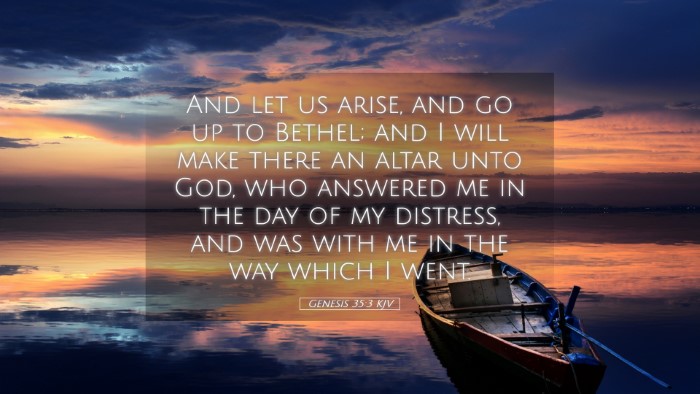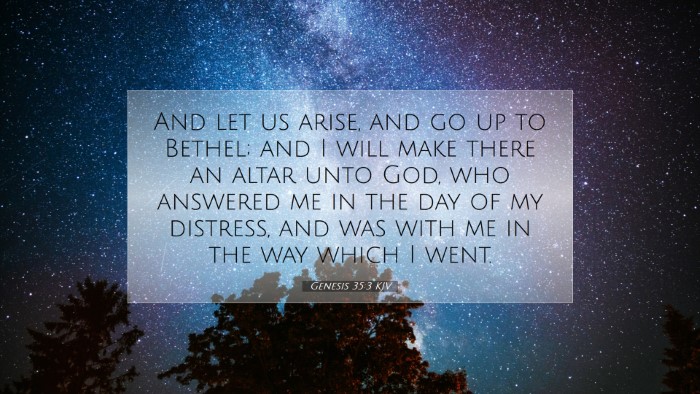Commentary on Genesis 35:3
Verse Reference: Genesis 35:3 - "And let us arise, and go up to Bethel; and I will make there an altar unto God, who answered me in the day of my distress, and was with me in the way which I went."
Introduction
Genesis 35:3 marks a significant moment in the life of Jacob after many trials and tribulations. This verse not only reflects Jacob's longing to return to a place of spiritual significance but also emphasizes God's faithfulness amid struggles. Various public domain commentaries shed light on the profound implications of this scripture for both personal and communal worship.
Contextual Analysis
Throughout Genesis, Jacob's life is punctuated by moments of divine encounter and personal growth. After fleeing from Esau, Jacob encounters God at Bethel, where he had an extraordinary vision (Genesis 28:10-22). Now, years later, he seeks to return to this sacred place, indicating a desire for renewal and recommitment to God.
Matthew Henry's Commentary Insights
Matthew Henry elaborates on Jacob's decision to return to Bethel as a call to spiritual revival. He remarks:
- “Jacob had a solemn vow to God at Bethel, and now he must fulfill it.” This indicates the importance of fulfilling commitments made to God.
- “He sought God's sanctuary amidst his troubles.” This underscores the belief that returning to God’s presence can provide solace and guidance during distress.
Albert Barnes' Insights
Albert Barnes emphasizes the prayerful nature of Jacob’s journey back to Bethel. He notes:
- “In his day of trouble, Jacob remembers the promises of God.” This reflects a profound understanding that trials often serve as reminders of past divine faithfulness.
- “The act of building an altar signifies complete devotion to God.” Building the altar serves as an act of worship and gratitude for God’s intervention in his life.
Adam Clarke's Commentary Analysis
Adam Clarke provides a deeper theological perspective on Jacob’s actions. He states:
- “Jacob's return to Bethel symbolizes a deeper return to covenant relationship with God.” This illustrates the renewal of Jacob’s faith and commitment.
- “The mention of distress shows Jacob's reliance on God's presence.” Clarke highlights the importance of recognizing one's need for God closely, especially in challenging times.
Theological Implications
Genesis 35:3 encapsulates fundamental themes that are pertinent to congregational life and personal devotion:
- Return to Worship: Jacob’s decision to return to Bethel signifies the importance of revisiting sacred spaces where one has encountered God. For believers today, this can mean returning to prayer, worship, and the community of faith.
- Building Altars: The act of constructing an altar is an illustration of personal commitment and public acknowledgment of God’s faithfulness. This theme resonates deeply within church settings today, where acts of dedication and worship continue to be vital.
- God's Faithfulness: Just as Jacob acknowledges God's past interventions, modern believers are reminded of the enduring promises of God, especially during trials and uncertainties.
Applications for Pastors and Leaders
The call to "arise and go up to Bethel" serves as a metaphor for spiritual leadership:
- Encouraging Congregational Revival: Pastors can remind their congregations of the importance of seeking renewal in their spiritual lives as Jacob did.
- Creating Spaces of Worship: Just as Jacob built an altar, church leaders should foster environments where worship and personal devotion can flourish.
- Testimony of God’s Faithfulness: Encourage believers to share their testimonies of God’s faithfulness to inspire others in their struggles.
Conclusion
In summary, Genesis 35:3 carries a powerful message of renewal, commitment, and the steadfastness of God. By analyzing this verse through the lenses of notable biblical scholars, we find that its implications are not only historic but also deeply relevant for contemporary faith practices. As Jacob sought to return to Bethel, so too should believers endeavor to reclaim their sacred encounters with God, building their lives as living altars of worship and testimony.


